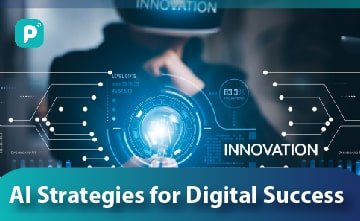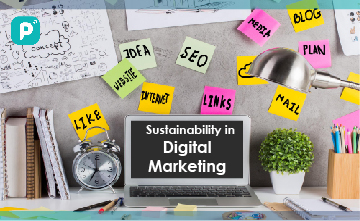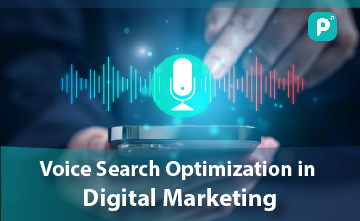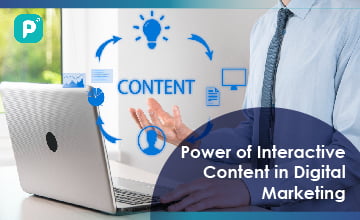The world of digital marketing is undergoing a major transformation driven by the integration of artificial intelligence (AI) and automation. As consumer behavior rapidly evolves in the digital age, brands can no longer rely on traditional marketing tactics alone to engage audiences and drive growth. The demand for highly personalized and contextual customer experiences continues to rise, pushing marketers to leverage emerging technologies like AI and automation to stay ahead of the curve.
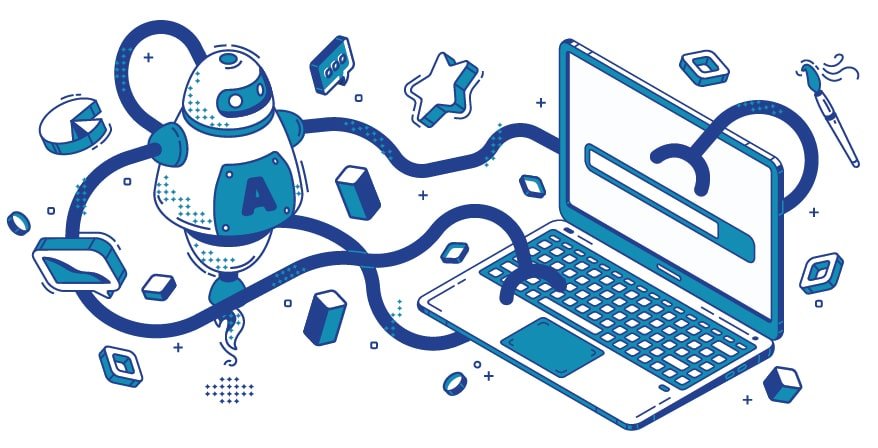
This blog post will explore how brands across industries are leveraging AI and automation to revolutionize their digital marketing strategies. We will analyze real-world examples of how these technologies are being implemented, statistics that highlight their business impact, and expert predictions on the future of AI and automation in digital marketing. Let’s dive in!
The Numbers Behind the AI and Automation Revolution
Before looking at practical applications, it’s important to understand the massive scale of the AI and automation revolution in digital marketing. Statistics highlight the growing relevance of these technologies:
According to Salesforce research, 76% of marketing leaders believe AI will revolutionize marketing by 2025. This reflects the technology’s vast potential to transform the field.
A study by McKinsey estimates that AI and automation in marketing could unlock over $1 trillion in value annually across sectors. The management consulting firm predicts these technologies will be crucial for effective marketing.
By 2023, Gartner predicts that 80% of marketing teams will be reliant on AI and automation to achieve their goals and stay competitive. The analyst firm envisions the technologies becoming almost indispensable.
The global market for AI in marketing alone is forecast to grow from $15.84 billion in 2021 to a staggering $107.5 billion by 2028, underlining the scale of adoption. These statistics from reputable research firms underline how AI and automation in digital marketing are transitioning from bleeding edge to mission-critical. Next, let’s explore how leading brands are already using these technologies to drive real business value.
Real-World Examples of AI and Automation in Digital Marketing
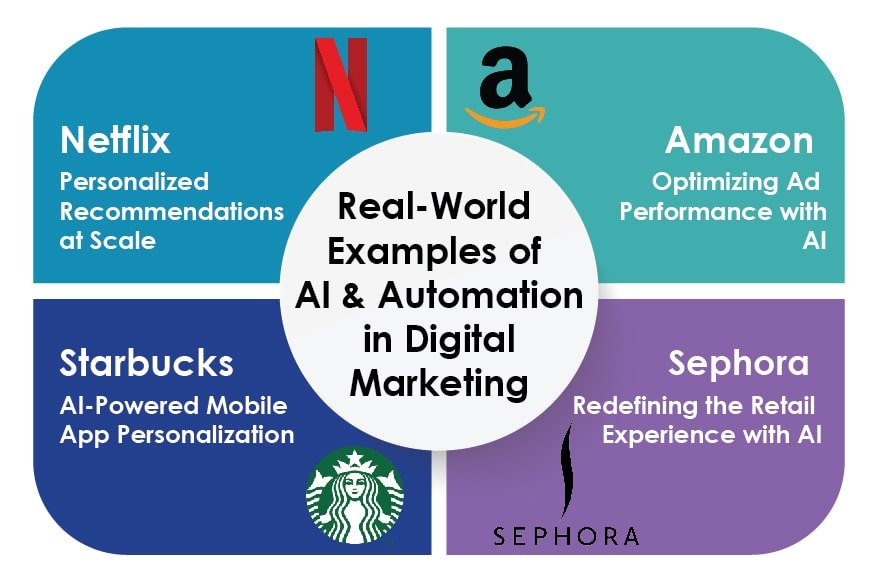
Netflix: Personalized Recommendations at Scale
The on-demand streaming giant Netflix has been at the forefront of leveraging AI and automation for mass personalization. Through advanced algorithms, Netflix analyzes users’ viewing history, favorites, ratings, search habits, and other data to deliver hyper-personalized recommendations. This contextual targeting helps keep viewers engaged on the platform longer.
Specifically, Netflix uses AI techniques like collaborative filtering and cluster analysis to categorize users into groups with similar tastes. Based on these groups, it recommends relevant titles to each user. The platform displays these as personalized rows like “Top Picks for John.” This personalized approach has been instrumental in helping Netflix retain and grow its subscriber base in an increasingly competitive video-streaming market.
The company reported having over 220 million global paid memberships as of Q1 2022.
Amazon: Optimizing Ad Performance with AI
E-commerce leader Amazon has integrated AI across its digital marketing, especially in sponsored ads. The company’s DSP or Demand-Side Platform uses real-time algorithms to optimize ad bidding and placement for marketers automatically. For instance, it allows keyword bids to be adjusted dynamically based on campaign performance.
Moreover, Amazon’s ad platform leverages AI to target ads to customers based on their purchase history and browsing habits on Amazon. This contextual targeting provides hyper-relevant ads, thereby improving click-through and conversion rates.
For advertisers, Amazon makes the AI-backed optimization processes automatic so they can focus on strategy and creativity. The e-tailer’s ad revenue surpassed $31 billion in 2021, proving the immense value of AI.
Starbucks: AI-Powered Mobile App Personalization
Coffeehouse leader Starbucks demonstrates how brands can use AI to personalize engagement via mobile apps. Through its popular app, Starbucks integrates various AI features to deliver tailored user experiences.
For instance, the app provides users with personalized product recommendations and prompts them to favorite beverages for easy re-ordering. Further, it sends users targeted notifications for location-specific deals and new launches based on purchase history.
Starbucks also rolled out a ‘Deep Brew’ AI initiative that performs contextual nudging through the app. For example, when users opt for cold beverages on hot days, it reminds them to try iced options. Such AI-enabled personalization has been key to Starbucks’ highly successful mobile strategy. The brand reported over 25 million monthly active app users in 2021, underlining exceptionally high engagement.
Sephora: Redefining the Retail Experience with AI
Beauty powerhouse Sephora is transforming traditional brick-and-mortar retail into immersive, personalized experiences via AI. A prime example is the company’s use of AI-powered digital makeover apps.
Using Augmented Reality (AR) technology, Sephora allows shoppers to digitally try on thousands of lipstick shades, eyeshadow colors, and foundations via a mobile app or in-store iPad stations. The Virtual Artist feature uses AI facial mapping to ensure colors are true-to-life.
Additionally, Sephora employs AI chatbots on its website and app to provide tailored beauty advice and product recommendations to online shoppers. The bots can answer thousands of queries, recommend best-sellers, help find the right makeup shades, and more. These innovations have helped Sephora offer shoppers personalized guidance and inspiration digitally and physically. As a result, the brand continues to dominate the prestige beauty market.
Key Applications of AI and Automation in Digital Marketing
Beyond the brands highlighted above, AI and automation are transforming virtually every facet of digital marketing. Let’s examine some of the key applications:
Programmatic Advertising
AI-based algorithms automatically bid for digital ad placements and optimize bids for maximum ROI in real-time. For instance, tools like Adobe Advertising Cloud and AcuityAds leverage AI to remove guesswork and make programmatic advertising ultra-efficient.
Chatbots

AI-powered chatbots like Pandorabots and ManyChat automate conversations with prospects and customers across platforms like websites, apps and messaging. They provide 24/7 support, engage visitors, qualify leads, and drive sales.
Social Media Management

AI streamlines repetitive social media marketing tasks like community management, post creation, and campaign analysis. Examples of AI social media tools include Hootsuite, Sprout Social, and Sprinklr.
Web Personalization
AI website tools like Optimizely, Evergage and Qubit personalize visitors’ browsing experiences based on their demographics, location, behavior and preferences. This boosts engagement and conversions.
Content Creation

AI copywriting tools like Jasper, Persado, and Copy.ai generate blog posts, social media captions, and other marketing copy in seconds tailored to brands’ guidelines. Email Marketing: AI solutions like Phrasee and Persado generate subject lines optimized for open rates and click-throughs. They also provide insights to improve email campaigns through A/B testing.
Marketing Analytics
AI analytics platforms like Datorama, Heap, and Funnel.io automate data analysis to uncover real-time customer insights that human analysts would take weeks to find.
Predictive Modeling
AI can forecast outcomes like lead scoring, churn rates, and LTV to inform decision-making across acquisition, retention and expansion. Tools like Definify and LoopMe leverage predictive AI.
Ad Creative Optimization
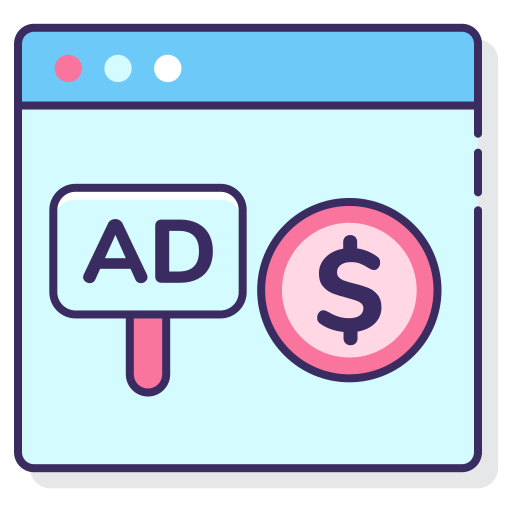
AI-based platforms like Kira optimize display ad creative elements like images, copy, layouts, colors, and calls-to-action for maximum engagement and conversions.
The ROI of AI and Automation – A Look at the Numbers
Given the exponential impact of AI and automation, quantifying the return on investment helps underline the tangible financial value they can unlock:
According to Salesforce, AI-powered marketing generates an average return of $128 for every $1 spent. The dramatic ROI makes the business case for AI investment stronger.
Research by Drift highlights that chatbots reduce customer service costs by 30% while boosting lead generation by over 400%. The automation of interactions delivers major cost and revenue impact.
A survey across multiple sectors by McKinsey reveals that early AI adopters achieve over 20% higher cash flow compared to competitors. Applied prudently, AI investment provides a significant competitive edge.
Figures from Juniper Research show AI chatbots and virtual assistants could deliver global cost savings of over $8 billion annually by 2022.
Aberdeen research reveals that AI users exceeded revenue goals by 15% compared to firms not using AI.
These stats provide tangible evidence of the revenue boosts and cost optimization AI and automation can produce when applied strategically. The numbers likely understate the full impact, as the technologies’ capabilities scale exponentially.
Unlocking Innovation – Emerging Trends in AI/Automation
As AI and automation evolve rapidly, they will enable marketing innovation through new applications:
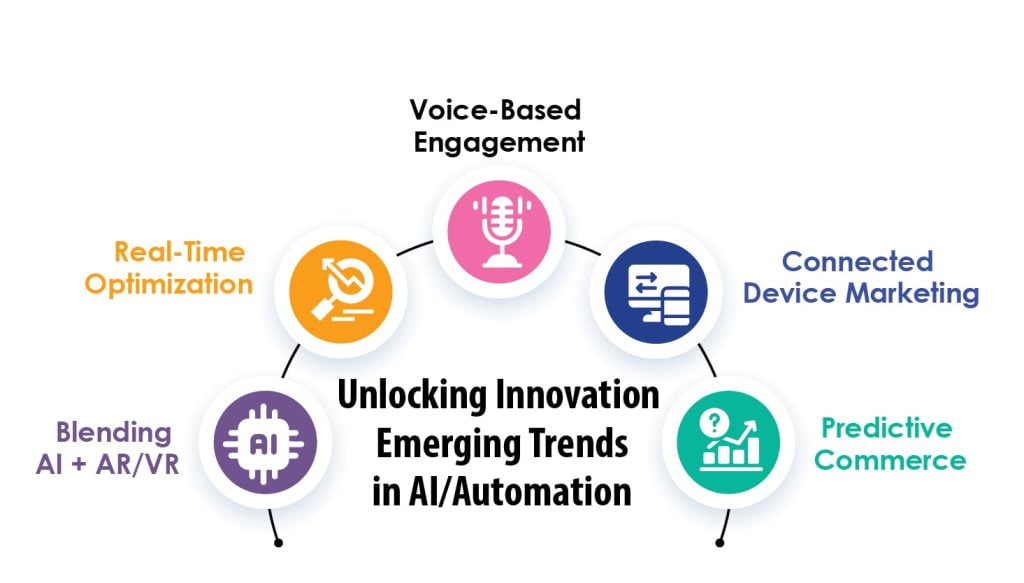
- Blending AI + AR/VR: Immersive experiences will become more intuitive through AI personalization. Brands like L’Oreal already offer AR makeup trials powered by AI.
- AI-Generated Content: Advanced natural language AI will automate higher-level content like articles, social posts, emails, websites, and ads.
- Real-Time Optimization: The combination of AI + 5G + Edge computing will enable instant dynamic optimization across digital touchpoints.
- Voice-Based Engagement: With the rise of voice assistants, AI will power hyper-personalized conversational experiences.
- Connected Device Marketing: AI will leverage data from connected devices like smart TVs and wearables to provide contextualized engagements through them.
- Predictive Commerce: Based on purchase propensities predicted by AI, brands like Amazon already prompt customers to buy relevant products in anticipation of needs.
These emerging applications demonstrate how AI and automation will unlock next-level innovation in areas from VR to IOT and enable marketers to engage customers in highly intuitive ways powered by data intelligence.
Conclusion
With AI equipping marketers to extract real-time insights from exponential data, strategy and decision-making will rely extensively on data intelligence vs gut.
While the human touch remains integral, it is evident that artificial intelligence will drive the next frontier of innovation, efficiency, and growth in digital marketing. As AI capabilities continue to develop at a blistering pace, it has become imperative for modern marketing leaders to make these emerging technologies core to their strategies and mindsets.
By harnessing the power of AI and automation prudently, digital marketing leaders will be able to reshape customer experiences, unlock new sources of value, and gain sustainable competitive advantage for their organizations. The marketing function itself will be reimagined and reinvented in the age of artificial intelligence.
Ready to unlock the potential of analytics for your digital marketing strategy? Connect with us today by emailing us at [email protected].
All images belong to their respective owners. Please email [email protected] if removal is required.

